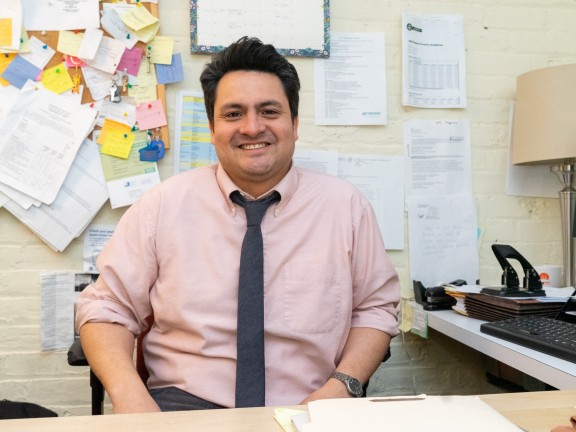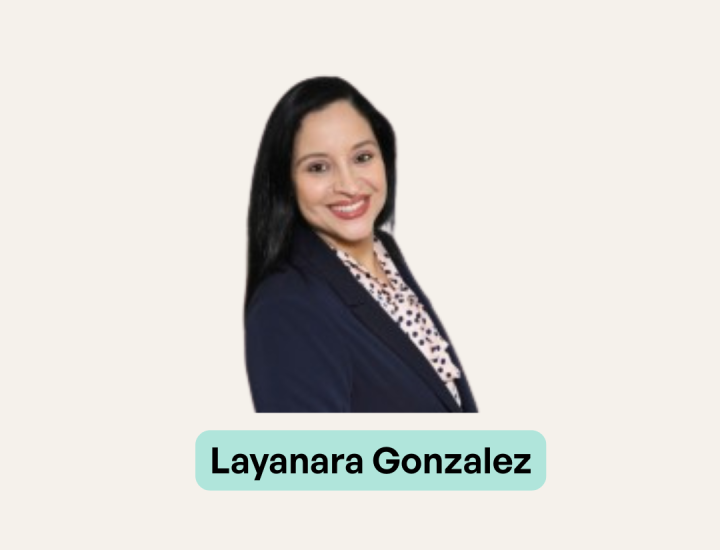Staff Highlight: Carlos Munoz (Staff Attorney of the Fund for Immigrant Justice)

There is no better feeling than telling a detained client that we have won, on any level. Sometimes hope is as important as outcomes. We aim for both.
In order to highlight the vital work, energy, and perspective that our staff bring to NSC, communications staff interviewed current staff members to showcase various programs. Read below for a Q and A with Carlos Munoz, the staff attorney for NSC's Fund for Immigrant Justice.
Tell us a little bit about yourself. What did you study in school?
I graduated college in 2000, but did not go to law school until 2014. I was a paralegal in various capacities in Philadelphia (corporate law firm, sole practioner) before finding my calling in non-profit public interest law while working at the AIDS Law Project of Pennsylvania. I worked there 2004 - 2008 when I followed my spouse to Denver, Colorado where they began their first job as a new lawyer in the Public Defender’s office. In Denver I took the LSATs and applied to schools, and came back to Philadelphia to start school at Temple Law in 2010, enrolled in the Evening division, while starting a new job working for Philadelphia Court of Common Pleas Judge Lisa M. Rau during the day. I focused on Trial Advocacy, and earned a Certificate in Trail Advocacy and Litigation, and I interned at the Office of the Public Defender in Camden, NJ.
Outside of work, what are your interests and hobbies?
I have 2 kids, 6 and 8, and their hobbies tend to be mine – Star Wars and dance parties. But in a former life I used to enjoy building and riding bicycles, and I used to love drawing and painting.
How did you become involved with the Nationalities Service Center?
After law school / before the bar exam results I was looking and through people in the Philadelphia public interest community I was told that NSC was hiring for a staff attorney. I looked into the organization, having routinely referred Law project clients to NSC in the past and interviewed and found it to be the same great place that truly tried to help as many people as possible.
Could you talk a little bit about the Fund for Immigrant Justice Initiative and how it differs from the other legal team’s work?
The NSC Legal Department offers free legal services to a majority of our clients, through different programs that fund work including for victims and survivors of torture, or victims of violence, including domestic violence, or trafficking victims. We also offer low fee legal services for those clients that do not fit into any of these programs. However, there are immigrants who are medically disabled, or homeless, who may not fit into any prescribed program but still need help. Some forms of past persecution are also not specifically funded, for example FGM/FGC cases where women are seeking asylum. Although NSC has always sought to help such clients despite their inability to pay, and not turn people away for lack of funds, under the Fund for Immigrant Justice campaign, I have the funded capacity to help these clients without it simply being added on to the already-large caseloads reserved for funded work. Furthermore, in this age of mass detention, clients who otherwise might have funds and the stability to hire a lawyer can not do so once they are detained. Especially for clients who supported their families paycheck-to-paycheck prior to detention, where the bread-winner is now detained, this situation can prevent even a deserving case from hiring a lawyer to present and win immigrant status. The FIJ seeks to identify such clients and represent such detained clients for free, who have relief but do not otherwise have the capacity to pay for legal representation. In this sense, the FIJ often seeks to keep families together where an inability to pay for a lawyer threatens to destroy long-established families.
What do you do in your role as an immigration lawyer with the Fund for Immigrant Justice? Could you describe a day in the job or talk about a particularly difficult case you had to handle?
In this role, I am able to represent detained clients who are detained, and I have so far handled cases for clients who are detained both a York County Prison, 2 hours west of Philadelphia in Lancaster, PA, and also in Pike County Correctional Facility, which is 2.5 hours north of Philadelphia. The Fund for Immigrant Justice allows me to travel to these locations to meet with these clients and prepare their legal defense, and represent them in the immigration court that is located within the York County Prison. In some cases, the simple cost of travel would be too much for a client whose income-earning spouse is now detained, and so typically even a pro bono lawyer would have trouble representing such a client unless they paid for their transportation out of their own pocket. So most weeks I try to travel to a detention center, to both see my clients in preparing their case but also to do consultations with other detained immigrants. I also work with case managers and doctors, when my clients have them, to help disabled clients obtain waivers of government fees and other requirements when their disability makes them eligible for an exception.
What is particularly difficult today, for any lawyer doing removal work, is the government’s mandate to not budge an inch, and to fight you on everything. My colleagues NSC and I have experienced universal appeal by the government after we have won cancellation case in court. For many clients who can not bond out, this means sitting for months while an appeal is pending, as well as finding representation for the appeal. So far the FIJ cases I have taken to appeal, but one can see that this is particularly draining of resources. Some clients can not handle being detained so long and give up on their case, opting to be removed (deported) rather than wait longer for an appeal that is not guarantee. This seems like an aim of the policy.
What are some of the challenges you face in your day-to-day work?
As described above, my clients are by definition either low-to-no income and/or physically or mentally disabled, and sometimes homeless. It is a challenge to even stay in touch with such clients, or to reach them when their cell phone number keeps changing. Most of my clients are not able to communicate through email. Many of them do not speak English. Also, I have clients who do not have anyone else on whom they can lean, and I’ve met with clients at their home to try and get documents when childcare or disability prevented them from travelling to Center City Philadelphia to meet with me. It helps a lot that I can speak Spanish, and I often give my cell phone to clients who may be able to send me a photo of a document whereas making a photocopy and sending it to me via mail or email seems overwhelming to them.
What is the most fulfilling part of your role?
I love public interest law. I am an immigrant from Chile, and grew up with loving parents and many opportunities, but I’ve always been keenly aware of how fleeting it is. My parents worked very hard to give me a very good life, but many people who don’t have it so good work equally hard. Life is a lot luck of the draw at birth, and fight like hell after that. So I’m honored to be able to give back, in terms of fighting for people who really need an advocate, to do that as my job. I feel so lucky to be in this position. There is no better feeling than telling a detained client that we have won, on any level. Sometimes hope is as important as outcomes. We aim for both.
What are your hopes for the Fund for Immigrant Justice in the future?
As mentioned, cases now not only mean representing up through the final hearing (the trail) but also fighting for your client on appeal. And because the next level appeal is to the Board of Immigration Appeals, a part of the department of Justice that tends to too-often rubber-stamp bad regulatory policy, the only true, consistent justice comes by filing in the federal court to vindicate what the law actually states. Although it’s not 'sexy' to file appeals up to levels – we all just want to see families reunited -- I hope that the need to appeal is recognized by funders, with an appreciation of the time and effort appeals take.


